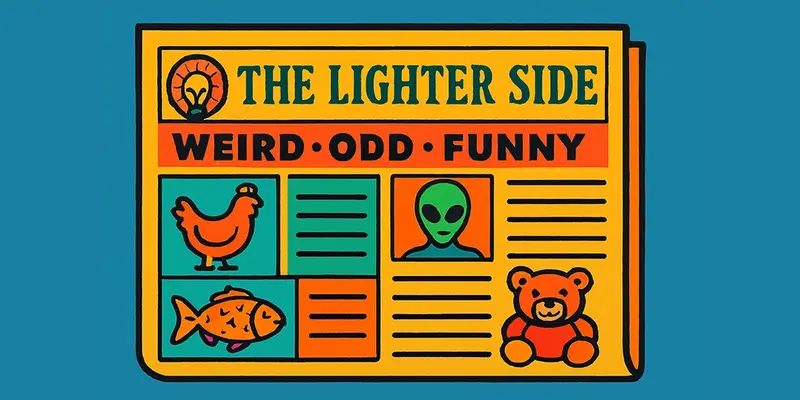
The Lighter Side
Weird, Odd, and Funny News Stories from the Week
If you thought late August was just about pumpkin spice creeping into your coffee, think again. The week of August 18–24 delivered a fresh batch of global oddities that made us laugh, squint, and question reality. Here are ten of the strangest, funniest, and most delightfully bizarre stories from around the world.
International Strange Music Day Strikes a Chord
August 24 marked the annual celebration of sonic eccentricity. From bagpipe techno to whale song remixes, people around the globe embraced the weirdest sounds they could find. In Tokyo, commuters were serenaded by a street performer playing a didgeridoo through a traffic cone. The day’s motto? “No judgment, just vibration.” Even Spotify reported a 300% spike in searches for “unusual instruments.”
Cats May Hold Clues to Alzheimer’s
A new study revealed that aging cats naturally develop brain changes similar to human Alzheimer’s, including amyloid plaques and memory loss. Researchers at the University of Edinburgh believe feline brains could help unlock treatments for neurodegenerative diseases. One scientist quipped, “Your cat forgetting where it left its toy mouse might be more profound than you think.”
Weaver Ants Defy Human Teamwork Flaws
In a groundbreaking study, scientists discovered that weaver ants actually work harder as their team grows—opposite of the “Ringelmann effect” seen in humans. Using a “force ratchet” system, ants at the back anchor while those in front pull, doubling their individual effort as the group expands. Researchers believe this could revolutionize swarm robotics and team dynamics in AI systems.
French Fries Linked to Diabetes Risk
A 40-year study of over 200,000 people found that eating French fries three times a week increases the risk of type 2 diabetes by 20%. Surprisingly, boiled, baked, or mashed potatoes showed no such risk. Replacing fries with whole grains reduced diabetes risk by 19%. The takeaway? It’s not the potato—it’s the deep fryer.
Great White Sharks’ DNA Still Baffles Scientists
Despite decades of research, scientists remain puzzled by the mismatch between great white sharks’ nuclear and mitochondrial DNA. A recent study traced their genetic bottleneck to the end of the last ice age, when they were confined to the Indo-Pacific. Today, three distinct populations exist, but the mystery of their genetic split remains unsolved. “We have no idea,” admitted one researcher.
Glass-Ceiling Toilet Sparks Hotel Confusion
A viral photo from a hotel in Europe showed a men’s restroom with a glass ceiling directly beneath the main entrance. Guests were baffled—was it an architectural oversight or avant-garde design? The hotel declined to comment, but online theories ranged from “art installation” to “plumbing prank.” Yelp reviews now include warnings: “Look down before you walk in.”
Snails That Regrow Eyes Offer Hope for Humans
Golden apple snails can fully regenerate their eyes in just 28 days. Scientists at UC Davis used CRISPR to identify the Pax6 gene as essential for this process, which is also present in humans. The discovery could lead to breakthroughs in treating retinal damage and degenerative eye diseases. One researcher called it “a moon landing moment for regenerative biology.”
Brain Layers Get Stronger with Age
Contrary to popular belief, parts of the brain—especially those that process touch—actually thicken with age. Using ultra-high-resolution MRI, researchers found that the middle and upper layers of the somatosensory cortex remain resilient, while only the deeper layers show decline. The study suggests that frequent use and stimulation can preserve brain function well into old age.
Dog Destroys Passport Hours Before Flight
A New Jersey couple’s golden retriever chewed up the wife’s passport just 12 hours before their flight to Jamaica. In a frantic scramble, she flew to Buffalo for an emergency passport appointment, got it printed minutes before boarding, and arrived in Jamaica only three hours behind her husband. The dog, reportedly unrepentant, has since been banned from the bedroom.
Trojan Horse Bacteria Deliver Cancer-Killing Viruses
Scientists at Columbia University engineered bacteria to smuggle viruses into tumors, bypassing the immune system. The bacteria act as “Trojan horses,” releasing the virus only inside cancer cells. Built-in safety features prevent the virus from spreading elsewhere. The technique, called CAPPSID, could revolutionize cancer treatment by combining microbial teamwork with precision targeting.